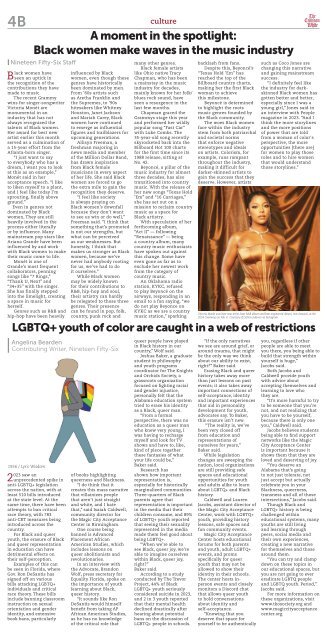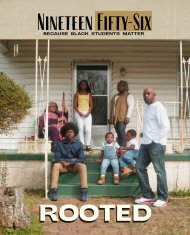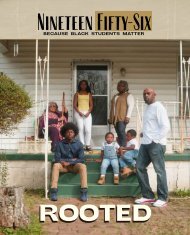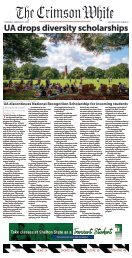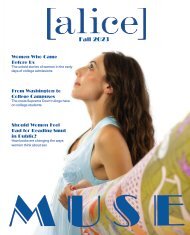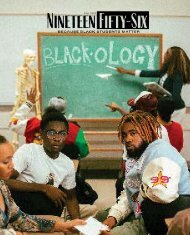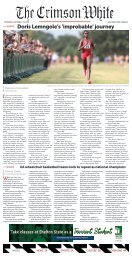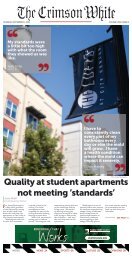The Crimson White Print Edition - February 29th, 2024
Create successful ePaper yourself
Turn your PDF publications into a flip-book with our unique Google optimized e-Paper software.
4B<br />
1956 / Lyric Wisdom<br />
2023 saw an<br />
unprecedented spike in<br />
anti-LGBTQ+ legislation<br />
across the nation, with at<br />
least 510 bills introduced<br />
at the state level. At the<br />
same time, there have been<br />
attempts to ban critical<br />
race theory, with 783<br />
anti-CRT measures being<br />
introduced across the<br />
country.<br />
For Black and queer<br />
youth, the erasure of Black<br />
and queer representation<br />
in education can have<br />
detrimental effects on<br />
their self-perception.<br />
Examples of this can<br />
be seen in Florida, where<br />
Gov. Ron DeSantis has<br />
signed off on various<br />
bills attacking LGBTQ+<br />
individuals and critical<br />
race theory. <strong>The</strong>se bills<br />
include banning classroom<br />
instruction on sexual<br />
orientation and gender<br />
identity, and extensive<br />
book bans, particularly<br />
of books highlighting<br />
queerness and Blackness.<br />
“I do think that it<br />
creates this mass narrative<br />
that villainizes people<br />
that aren’t just straight<br />
and white, and I hate<br />
that,” said Isaiah Caldwell,<br />
community director for<br />
the Magic City Acceptance<br />
Center in Birmingham.<br />
One course being<br />
banned is Advanced<br />
Placement African<br />
American Studies, which<br />
includes lessons on<br />
queer abolitionists and<br />
revolutionaries.<br />
In an interview with<br />
the Advocate, Brandon<br />
Wolf, press secretary for<br />
Equality Florida, spoke on<br />
the importance of youth<br />
learning about Black,<br />
queer history.<br />
“It sounds like Ron<br />
DeSantis would himself<br />
benefit from taking AP<br />
African American Studies,<br />
as he has no knowledge<br />
of the critical role that<br />
culture<br />
A moment in the spotlight:<br />
Black women make waves in the music industry<br />
Nineteen Fifty-Six Staff<br />
Black women have<br />
seen an uptick in<br />
the recognition of the<br />
contributions they have<br />
made to music.<br />
<strong>The</strong> recent Grammy<br />
wins for singer-songwriter<br />
Victoria Monét are<br />
monumental in an<br />
industry that has not<br />
always recognized the<br />
talents of Black women.<br />
Her award for best new<br />
artist earlier this month<br />
served as a culmination of<br />
a 15-year effort from the<br />
Atlanta-born singer.<br />
“I just want to say<br />
to everybody who has a<br />
dream, I want you to look<br />
at this as an example,”<br />
Monét said in her<br />
acceptance speech. “I like<br />
to liken myself to a plant,<br />
and I feel like today I’m<br />
sprouting, finally above<br />
ground.”<br />
Even in genres not<br />
dominated by Black<br />
women, <strong>The</strong>y are still<br />
heavily involved in the<br />
process either literally<br />
or by influence. Many<br />
mainstream pop stars like<br />
Ariana Grande have been<br />
influenced by and work<br />
with Black women to make<br />
their music come to life.<br />
Monét is one of<br />
Grande’s most frequent<br />
collaborators, penning<br />
songs like “7 Rings,”<br />
“Thank U, Next” and<br />
“34+35” with the singer.<br />
She has finally stepped<br />
into the limelight, creating<br />
a space in music for<br />
herself.<br />
Genres such as R&B and<br />
hip-hop have been heavily<br />
influenced by Black<br />
women, even though these<br />
genres have historically<br />
been dominated by men.<br />
From ’60s artists such<br />
as Aretha Franklin and<br />
the Supremes, to ’90s<br />
hitmakers like Whitney<br />
Houston, Janet Jackson<br />
and Mariah Carey, Black<br />
women have continued<br />
to emerge as influential<br />
figures and trailblazers for<br />
upcoming generations.<br />
Allisyn Freeman, a<br />
freshman majoring in<br />
news media and member<br />
of the Million Dollar Band,<br />
has drawn inspiration<br />
from Black female<br />
musicians in every aspect<br />
of her life. She said Black<br />
women are forced to go<br />
the extra mile to gain the<br />
recognition they deserve.<br />
“I feel like society<br />
is always praying on<br />
Black women’s downfall<br />
because they don’t want<br />
to see us win or do well,”<br />
Freeman said. “I think that<br />
something that’s promoted<br />
is not our strengths, but<br />
what can be perceived<br />
as our weaknesses. But<br />
honestly, I think that<br />
makes us stronger as Black<br />
women, because we’ve<br />
never had anybody rooting<br />
for us, we’ve had to do<br />
it ourselves.”<br />
While Black women<br />
may be widely known<br />
for their contributions to<br />
R&B, hip-hop and soul,<br />
their artistry can hardly<br />
be relegated to those three<br />
genres. <strong>The</strong>ir presence<br />
can be found in pop, folk,<br />
country, punk rock and<br />
LGBTQ+ youth of color are caught in a web of restrictions<br />
Angelina Bearden<br />
Contributing Writer, Nineteen Fifty-Six<br />
many other genres.<br />
Black female artists<br />
like Ohio native Tracy<br />
Chapman, who has been<br />
a mainstay in the music<br />
industry for decades,<br />
mainly known for her folk/<br />
blues rock sound, have<br />
seen a resurgence in the<br />
last few months.<br />
Chapman graced the<br />
Grammys stage this year<br />
and performed her wildly<br />
popular song “Fast Car”<br />
with Luke Combs. <strong>The</strong><br />
35-year-old song recently<br />
skyrocketed back into the<br />
Billboard Hot 100 charts<br />
for the first time since its<br />
1988 release, sitting at<br />
No. 42.<br />
Beyoncé, a pillar of the<br />
music industry for almost<br />
three decades, has also<br />
transitioned into country<br />
music. With the release of<br />
her new songs “Texas Hold<br />
’Em” and “16 Carriages,”<br />
she has set out on a<br />
mission to reclaim country<br />
music as a space for<br />
Black artistry.<br />
With speculation of her<br />
forthcoming album,<br />
“Act II” — following<br />
“Renaissance” — being<br />
a country album, many<br />
country music enthusiasts<br />
have spoken out against<br />
this change. Some have<br />
even gone as far as to<br />
exclude her newest work<br />
from the category of<br />
country music.<br />
An Oklahoma radio<br />
station, KYKC, refused<br />
to play Beyoncé on the<br />
airways, responding in an<br />
email to a fan saying, “we<br />
do not play Beyonce on<br />
KYKC as we are a country<br />
music station,” sparking<br />
queer people have played<br />
in Black history in our<br />
country,” Wolf said.<br />
Joshua Baker, a graduate<br />
student in philosophy<br />
and youth programs<br />
coordinator for <strong>The</strong> Knights<br />
and Orchids Society, a<br />
grassroots organization<br />
focused on fighting racial<br />
and gender injustice,<br />
personally felt that the<br />
Alabama education system<br />
tried to erase his identity<br />
as a Black, queer man.<br />
“From a formal<br />
perspective, there was no<br />
education as a queer man<br />
who knew very young, I<br />
was having to recharge<br />
myself and look for TV<br />
shows and have to, like,<br />
kind of piece together<br />
these fantasies of what<br />
your life could be,”<br />
Baker said.<br />
Research has<br />
shown how important<br />
representation is,<br />
especially for historically<br />
marginalized communities.<br />
Three-quarters of Black<br />
parents agree that<br />
representation is important<br />
in the media that their<br />
children consume, and 89%<br />
of LGBTQ+ youth reported<br />
that seeing their sexuality<br />
represented in the media<br />
made them feel good about<br />
being LGBTQ+.<br />
“When we’re able to<br />
see Black, queer joy, we’re<br />
able to imagine ourselves<br />
within Black, queer joy,<br />
right?”<br />
Baker said.<br />
According to a study<br />
conducted by <strong>The</strong> Trevor<br />
Project, 44% of Black<br />
LGBTQ+ youth seriously<br />
considered suicide in 2023,<br />
and 2 in 3 youth reported<br />
that their mental health<br />
declined drastically after<br />
hearing about potential<br />
bans on the discussion of<br />
LGBTQ+ people in schools.<br />
backlash from fans.<br />
Despite this, Beyoncé’s<br />
“Texas Hold ’Em” has<br />
reached the top of the<br />
Billboard country charts,<br />
making her the first Black<br />
woman to achieve<br />
this milestone.<br />
Beyoncé is determined<br />
to highlight the roots<br />
music genres founded by<br />
the Black community.<br />
<strong>The</strong> woes Black women<br />
face within the industry<br />
stem from both patriarchal<br />
and societal norms<br />
that enforce negative<br />
stereotypes and ideals<br />
on artists. Colorism, for<br />
example, runs rampant<br />
throughout the industry,<br />
making it difficult for<br />
darker-skinned artists to<br />
gain the success that they<br />
deserve. However, artists<br />
“If the only narratives<br />
we see are around grief, or<br />
around trauma, that might<br />
be the only way we think<br />
about our ability to exist,<br />
right?” Baker said.<br />
Erasing Black and queer<br />
history takes away more<br />
than just lessons on past<br />
events; it also takes away<br />
important connections of<br />
self-acceptance, identity<br />
and important experiences<br />
that aid in personality<br />
development for youth,<br />
advocates say. To Baker,<br />
this erasure isn’t new.<br />
“<strong>The</strong> reality is, we’ve<br />
been very closed off<br />
from education and<br />
representations of<br />
ourselves for years,”<br />
Baker said.<br />
While legislation<br />
changes are sweeping the<br />
nation, local organizations<br />
are still providing safe<br />
spaces and educational<br />
opportunities for youth<br />
and adults alike to learn<br />
about LGBTQ+ and Black<br />
history.<br />
Caldwell and Lauren<br />
Jacobs, assistant director of<br />
the Magic City Acceptance<br />
Center, work with LGBTQ+<br />
youth, providing history<br />
lessons, safe spaces and<br />
fun community events.<br />
Magic City Acceptance<br />
Center hosts educational<br />
forums for both parents<br />
and youth, adult LGBTQ+<br />
events, and proms<br />
specifically for queer<br />
youth that may not be<br />
allowed to show their<br />
identity in their schools.<br />
<strong>The</strong> center hosts inperson<br />
events and closely<br />
monitors a Discord chat<br />
that allows queer youth<br />
to hold conversations<br />
about identity and<br />
self-acceptance.<br />
“Knowing that you<br />
deserve that space for<br />
yourself to be authentically<br />
such as Coco Jones are<br />
changing this narrative<br />
and gaining mainstream<br />
success.<br />
“I definitely feel like<br />
the industry for darkskinned<br />
Black women has<br />
gotten better and better,<br />
especially since I was a<br />
young girl,” Jones said in<br />
an interview with People<br />
magazine in 2023. “And I<br />
think the more storylines<br />
and the more positions<br />
of power that are told<br />
from a woman of color's<br />
perspective, the more<br />
opportunities [there are]<br />
for women to play those<br />
roles and to hire women<br />
that would understand<br />
those storylines.”<br />
Victoria Monét won best new artist, best R&B album and best engineered album, non-classical, at the<br />
<strong>2024</strong> Grammys on Feb. 4. Courtesy of Dalvin Adams via Instagram.<br />
you, regardless if other<br />
people are able to meet<br />
you there, you being able to<br />
build that strength within<br />
yourself is huge,”<br />
Jacobs said.<br />
Both Jacobs and<br />
Caldwell provide youth<br />
with advice about<br />
accepting themselves and<br />
learning to love who<br />
they are.<br />
“It’s more harmful to try<br />
to be someone that you’re<br />
not, and not realizing that<br />
you have to be yourself,<br />
because there is only one<br />
you,” Caldwell said.<br />
Jacobs believes students<br />
being able to find support<br />
networks like the Magic<br />
City Acceptance Center<br />
is important because it<br />
shows them that they are<br />
loved and deserving of joy.<br />
“You deserve an<br />
Alabama that’s going<br />
to not just tolerate, not<br />
just accept but actually<br />
celebrate you in your<br />
Blackness, queerness,<br />
transness and all of those<br />
intersections,” Jacobs said.<br />
Though Black and<br />
LGBTQ+ history is being<br />
challenged within<br />
educational systems, many<br />
youths are still living<br />
and learning through<br />
peers, social media and<br />
their own experiences,<br />
creating a new narrative<br />
for themselves and those<br />
around them.<br />
“You can try and clamp<br />
down on these topics in<br />
our educational spaces, but<br />
you are not going to ever<br />
eradicate LGBTQ people<br />
and LGBTQ youth. Period,”<br />
Jacobs said.<br />
For more information on<br />
these organizations, visit<br />
www.tkosociety.org and<br />
www.magiccityacceptance<br />
center.org


